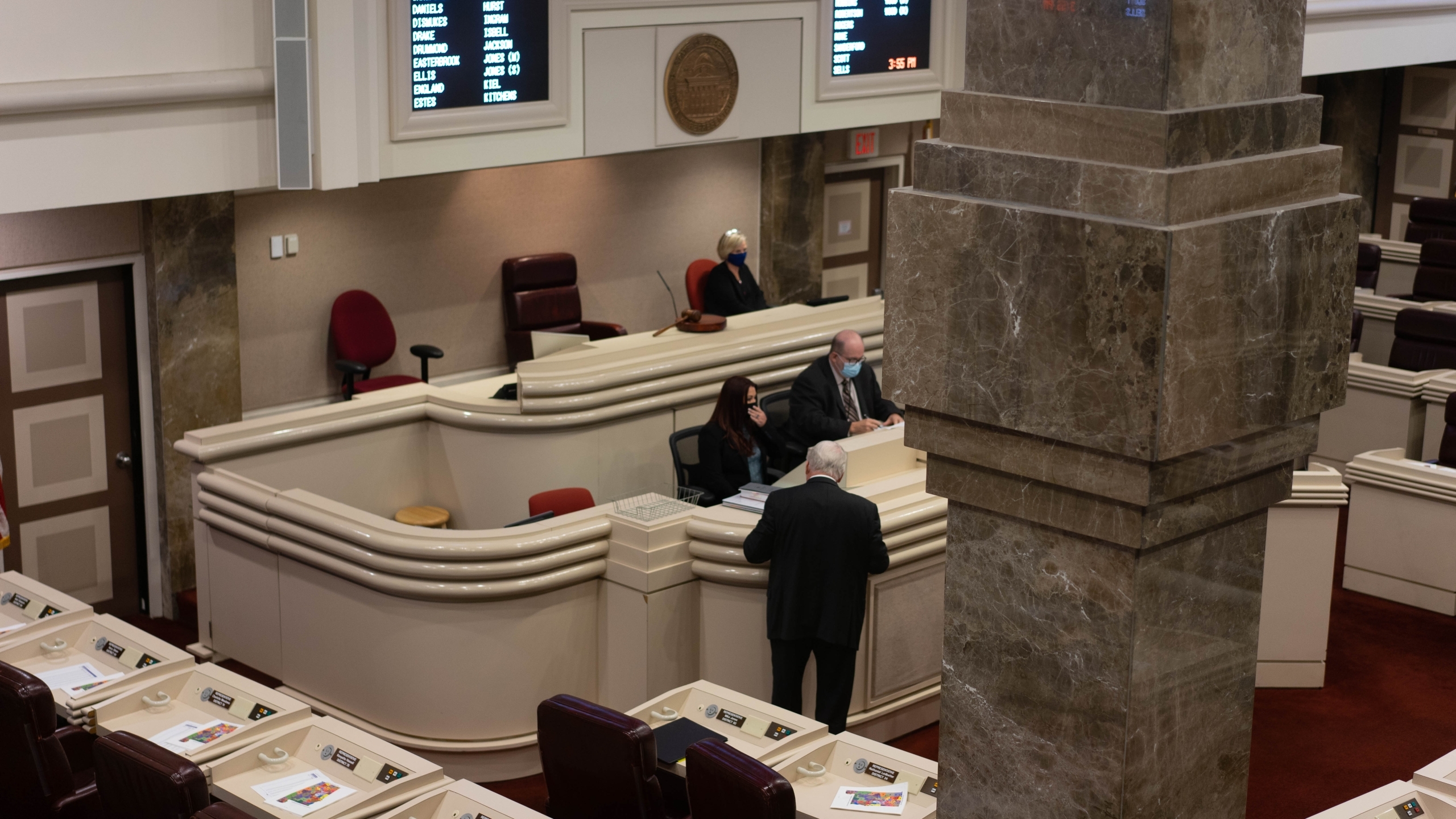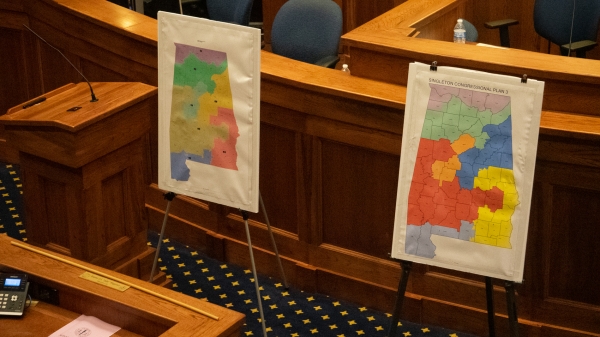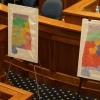After three hours of debate, the Alabama House of Representatives passed new district lines for its own chamber 68-35.
But the plan drew objections from both Republicans and Democrats for a variety of reasons.
The process
Rep. Chris Pringle, R-Mobile, brought the substituted bill before the House Monday afternoon after the body approved a new congressional district map earlier in the day.
The substitute bill mostly mirrored the original bill introduced in the House last Thursday, but made some changes to districts in the Mobile area. Pringle called the changes “minor” but some Democrats challenged that the revised version should be able to be seen by the public before it came to a vote. Only the original version of the map was available to the public at the time of the meeting.
Pringle said the reapportionment committee worked to keep as many counties whole as possible, respect precinct lines, reach deviation, comply with the Voting Rights Act and keep incumbents from being pitted against each other.
“The 2017 plan that passed split 400 voting precincts,” Pringle said. “We only had 19 counties whole. We have dramatically reduced that. I think we have 57 splits and 28 whole counties.”
These pillars came up repeatedly throughout the evening as lawmakers lobbed suggestions for changes.
But not all lawmakers agreed on all of those parameters.
House Minority Leader Anthony Daniels, D-Huntsville, said more counties could have been kept whole in the House plan, but Pringle questioned whether Daniels had taken incumbency into account.
“It doesn’t appear clear that is a requirement,” Daniels said. “There have been times incumbents have been placed together.”
Pringle said it was a guideline suggestion that the committee adhered to if possible. With 16 incumbents not returning to the House, Pringle said the committee felt they could draw a map without making any incumbents face each other, which is true of the plan that ultimately passed.
Democrats also raised concerns about public hearings being held primarily in the mornings during normal business hours and a lack of transparency about the maps beforehand.
Rep. Chris Englad, D-Tuscaloosa, said the process was flawed at a fundamental level.
“My real heartburn is with this process,” England said, after pointing out specific issues he had with his district. “This should never be an inside-out process. Who cares what I think about my district? It’s not my seat. It belongs to the people the seat represents. Before we get to sit down with you, you should sit down with them. The folks we are supposed to represent are supposed to tell us what these maps look like, not what opportunity it gives me to get re-elected. The whole point of this process is not me picking them; it’s them picking me. That’s why this process isn’t organic.”
England also questioned what hierarchy the committee used to determine which standards took priority when in conflict, and specifically criticized placing an emphasis on keeping precincts whole as the Legislature has no control over precinct lines.
Pringle responded that the courts ruled that precinct lines need to be taken into account when redistricting.
“The last lawsuit, we got in trouble for breaking precincts along racial lines,” Pringle said. “To me, that court case carries the weight of law.”
Substitutes proposed
Several legislators brought forward concerns about their individual districts, including Rep. Charlotte Meadows, R-Montgomery, whose district would become majority-minority and likely a Democratic seat.
Meadows said the new district, which would be 52 percent Black and 43 percent white, would be “nothing like the district I had.”
“I detest the word race,” Meadows said. “I detest using the word Black and white. It really makes me ill to even say this. … I hope at some point in the future of our state, I hope we can ignore race.”
Groans rose from the floor when Meadows echoed an earlier line from Rep. Merika Coleman, D-Birmingham, calling herself a “social justice personality.”
But Democrats weren’t the only ones bemoaning Meadows’ plan to keep her district as is — Pringle said the change “would unquestionably violate the Voting Rights Act.”
“If you adopt this substitute, this is what you are doing: it’s a race-based conscious decision,” Pringle said. “District 76 would be 84.72 percent black. Overpopulating a district with minority Black members like this is called packing. This plan as presented before you today would change District 69 to 49.09 percent Black. So it packs one district up to above 80 percent and takes one below 50 percent based on race-based drawing.”
The substitute was tabled by a 59-20 vote with 18 abstentions.
Rep. Dexter Grimsley, D-Newville, brought a substitute he said would make his district more equal to that of Rep. Steve Clouse, R-Ozark, and would give the districts straight, congruent lines.
But Pringle said it would run afoul of the Voting Rights Act.
“It splits precincts exactly across racial lines,” Pringle said. “The racial split has got us in trouble … There’s no Voting Rights Act reason for making the changes.”
The substitute was tabled 64-34.
Rep. Jeremy Gray, D-Opelika, introduced a substitute plan that focused on keeping counties whole instead of on preserving precincts or incumbencies.
When Pringle asked if the map would pit any incumbents against each other, Gray responded “a few,” and then when pressed said “two or three.” A few minutes later, Pringle said it had been determined the map would actually pit 10 incumbents against each other.
“I think you’re ignoring other committee guidelines,” Pringle said.
Pringle added that seven majority-minority districts would be abolished under the plan.
The substitute was tabled 71-21 with one abstention.
The House then voted to cloture debate and bring the original substituted bill to vote for final passage.
In closing comments on the bill, Daniels reiterated his stance that more emphasis should have been placed on keeping counties whole and not on incumbency, and alluded to pending litigation over the redistricting process.
“I find it very difficult that we are protecting incumbents instead of communities of interest,” Daniels said. “There will be next steps in this particular process. I look forward to basically fighting this out in court to get to a process that is going to work for the people of Alabama to make sure their voices get heard.”
Rep. Thomas Jackson, D-Thomasville, said the process would not be contentious if the leadership was fair.
“When we use integrity and character in drawing these districts, you don’t come up with these issues,” Jackson said. “You keep talking about the lawsuits — we sued because it is unfair. Fairness is not part of your repertoire, not in your DNA. It troubles me we have to fight this fight every 10 years. It doesn’t make sense. It’s preposterous that minorities have to go to court to try to get what is fair and equitable to represent their people.”
American Rescue Plan funds
The House voted 103-0 to allocate $80 million in American Rescue Plan funds, with $40 million each going towards the Alabama Hospitals Association and the Alabama Nursing Homes Association.
England pointed out that the House voted to give 10 times as much of the COVID-19 relief money to prisons thanthat it did to hospitals.
“I’m just saying, man, that kind of says something,” England said. “We’re willing to give $400 million to build prisons, but AHA asks for $200 million and we got $40 million — that says something. It kind of suggests something about our priorities that we’re willing to spend more to incarcerate you than we are to keep you healthy.”
Lawmakers also expressed hope that more funding for the hospitals is addressed quickly at the beginning of the regular session.
The bills now head over to the Senate for consideration.












































